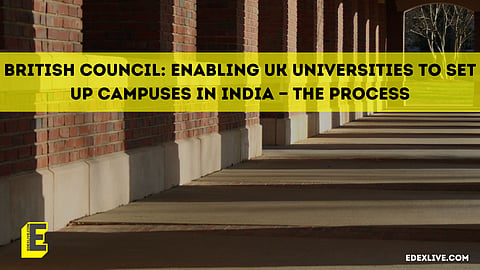British Council: Enabling UK universities to set up campuses in India — the process
This facilitating the establishment of UK university campuses in India... how did it all begin for the British Council?
The British Council plays a pivotal role in facilitating the establishment of UK university campuses in India. It views the setting up of International Branch Campuses in India as a natural next step in the deepening of India and UK education collaboration. British Council has been engaged in delivering the UK-India Education Research Initiative for the past 19 years along with the Newton Bhabha Programme.
For the past 4 years the Going Global Partnerships (GGP) and the International Science Partnership Fund (ISPF) programmes have encouraged partnership between higher education institutions in the UK and India.
British Council and the UK Higher education sector welcomed the focus on Internationalisation and Globalisation of the Indian Higher education sector in the National Education Policy 2020.
Following the adoption of NEP 2020, we have been actively sharing with UK institutions the emerging opportunities for partnership and engagement arising from the rapid liberalisation of India’s regulatory framework.
We signed the Mutual Regulation of Qualification agreement that makes it possible to utilise the articulation opportunities through joint and dual degrees.
How did your coordination with University Grants Commission (UGC) go?
We had the privilege of engaging with the University Grants Commission (UGC) during the consultative phase of the Foreign Higher Educational Institutions (FHEI) International Branch Campus regulations — even before they came into effect. We convened a meeting of 5 UK universities with branch campuses and the Universities UK to directly give their suggestions and feedback to the then UGC Chairman, on the draft regulation. We are pleased to say that the UGC has been extremely responsive to the suggestions and ideas that were exchanged.
The British Council provides strategic guidance, deep local insights, and tailored support to help UK institutions navigate India’s evolving regulatory frameworks, such as the University Grants Commission (UGC) regulations for International Branch Campuses (IBC).
Our thorough understanding of Indian culture and education systems ensures UK universities are well-informed and culturally attuned, fostering meaningful collaborations.
How did you coordinate this process?
The British Council also facilitated this process by coordinating high-level education missions to India, attended by vice-chancellors and senior university leaders. These missions have served as critical platforms for engagement with Indian regulators, government officials, and potential partners.
For instance, during two such missions, we organised sessions on UGC-IBC regulations, where UGC officials directly addressed delegates, providing clarity on compliance and opportunities. Additionally, we connected UK universities with key stakeholders, such as GIFT City authorities, to showcase the broader spectrum of possibilities in India.
Through these efforts — offering regulatory clarity, market intelligence, and strategic connections — the British Council has empowered UK universities to make informed decisions and seize opportunities in India. By fostering these collaborations, we are driving a new era of academic excellence and impactful partnerships between the UK and India. Currently, seven UK universities have either received their Letter of Intent from the UGC or GIFT City or have formally expressed their intention to apply.



